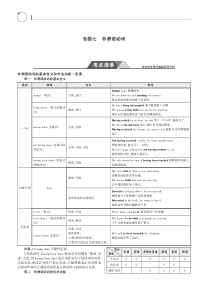 PDF
PDF
【文档说明】高考英语一轮复习(课标版天津适用B版)教师用书:专题七 非谓语动词PDF版含答案.pdf,共(9)页,1.089 MB,由envi的店铺上传
转载请保留链接:https://www.doc5u.com/view-8ba78ef236def9ccef788a8ed092096e.html
以下为本文档部分文字说明:
专题七非谓语动词对应学生用书起始页码P90非谓语动词的基本含义和句法功能一览表表一非谓语动词的基本含义类别结构含义例句v.⁃ingdoing(一般式)主动,进行boilingwater沸腾的水Doyouknowthegirlstandingoverthere?你认识站在那里的那个女孩吗?bein
gdone(一般式的被动式)被动,进行Hehatesbeinginterrupted.他不愿意被人打断。Thehousesbeingbuiltnowarefortheteachers.现在正在建的那些房子是为
老师而建的。havingdone(完成式)主动,完成Havingwaitedforanhour,heleft.等了一个小时,他离开了。Hedeniedhavingbeenthere.他不承认到过那里。Havingre
viewedhislessons,hewenttobed.他复习完功课就睡觉了。nothavingdone(完成式的否定式)主动,完成,否定Nothavingreceivedareply,hewroteanotherletter.没收到回复,他又写了一封信。Dontbeangryw
ithmefornothavingwrittentoyou.我没给你写信,请别生我的气。havingbeendone(完成式的被动式)被动,完成Thesafeshowednosignofhavingbeentouched.保险柜
没有被人动过的痕迹。过去分词done被动,完成ThestorytoldbyTomisveryinteresting.汤姆讲的故事非常有趣。Thehousesbuiltlastyearareverybig.去年建的那些房子很大。表所处的状态或特征Devot
edtohelpingothers,heisrespected.他因致力于帮助别人而受到尊重。Interestedinthebook,hewantstobuyit.他对这本书感兴趣想买下来。不定式todo(一般式)将来,主动Ihavemuchworktod
o.我有很多工作要做。tobedone(一般式的被动式)将来,被动Thehousestobebuiltnextmonthareverybig.下个月将要建的那些房子很大。tohavedone(完成式)完成,主动使用条件:1)看结构是否需要;2)看是
否表达过去或完成之意。Hessaidtohaveinventedthetelephone.据说是他发明了电话。注意:1.havingdone不能作定语。2.作状语时,havingbeendone和过去分词都有“被动、完成”之意,但havingbeendone表示动作在句子谓语动词动作之前完成
,而过去分词只表示完成,不能明确表示分词所表示的动作和句子谓语动词所表示的动作之间的先后关系。表二非谓语动词的句法功能成分形式主语宾语宾语补足语表语定语状语不定式√√√√√√动名词√√√√现在分词√√√√专题七非谓语动
词59续表成分形式主语宾语宾语补足语表语定语状语过去分词√√√√不定式既有名词的作用,又兼有形容词、副词的作用,能作除谓语之外的所有成分。分词只有形容词、副词的作用,可作宾补、定语、表语及状语。动名词只有名词的作用,可作主语、宾语、表
语或定语。单项填空:①Bthecourseverydifficult,shedecidedtomovetoalowerlevel.A.FindB.FindingC.TofindD.Found②Therehavebeenseveralneweven
tsDtotheprogramforthe2008BeijingOlympicGames.A.addB.toaddC.addingD.added③TheairportBnextyearwillhelppromotetourisminthisarea.A.beingcompletedB
.tobecompletedC.completedD.havingbeencompleted④AIDSissaidDthebiggesthealthchallengetobothmenandwomeninthatareaoverthe
pastfewyears.A.thatitisB.tobeC.thatithasbeenD.tohavebeen⑤Igottotheofficeearlierthatday,Dthe7:30trainfromPad
dington.A.caughtB.tohavecaughtC.tocatchD.havingcaught⑥Withtheworldchangingfast,wehavesomethingnewCwithallbyourselves
everyday.A.dealB.dealtC.todealD.dealing⑦(2014福建,27)CthepastyearasanexchangestudentinHongKong,Lindaappearsmorematurethanthoseof
herage.A.SpendingB.SpentC.HavingspentD.Tospend考点一非谓语动词作状语一、不定式作状语1.不定式作目的状语不定式作目的状语的情况较多,如果强调目的性时,不定式前还可加inorder或soas,构成“inor
dertodo”或“soastodo”结构。“inordertodo”结构作目的状语时,可以放在句首也可放在句中;“soastodo”结构只能放在句中。“inordertodo”“soastodo”结构置于句中时,不能用逗号隔开。如:Hermotherplansto
flytoBeijingatleastfourtimesayear(soas/inorder)tovisither.她母亲计划每年至少四次飞到北京来看她。Bobtookdownmytelephonenumbersoas/inordernottoforgetit.鲍勃记下我的
电话号码以免忘记。单项填空:①(2014湖南,35)Courselvesfromthephysicalandmentaltensions,weeachneeddeepthoughtandinnerquietness.A.HavingfreedB.FreedC.Tof
reeD.Freeing②(2014陕西,20)Cthedifficultmathsproblem,IhaveconsultedProfessorRussellseveraltimes.A.WorkingoutB.
WorkedoutC.ToworkoutD.Workout③(2014重庆,11)GroupactivitieswillbeorganizedafterclassDchildrendevelopteamspirit.A.helpingB.havinghelp
edC.helpedD.tohelp④IstoppedthecarCashortbreakasIwasfeelingtired.A.takeB.takingC.totakeD.taken2.不定式作结果状语不定式作结果状语常用在下列结构中:so...asto;suc
h...asto;...enoughto;onlyto(常表示意外结果或事与愿违的结果);too...to等。如:Imnotsostupidastowriteitdown.我不至于愚蠢到把它写下来。Janehurriedbackonlyto
findthathermotherhadleft.简匆忙赶回来却发现她母亲已经离开了。(表示“事与愿违”的结果)Imtootiredtostayuplonger.我太累而不能再熬夜了。注意:在下列结构中,too...to...并非是“太
……而不能……”之意。与too...to...搭配的形容词常见的有:pleased,ready,willing,glad,happy等。如:Imonlytoogladtohavepassedtheexa
m.考试及格我太高兴了。单项填空:⑤Tomtookataxitotheairport,onlyBhisplanehighupinthesky.A.findingB.tofindC.beingfoundD.tohavefound⑥Georger
eturnedafterthewar,onlyAthathiswifehadlefthim.A.tobetoldB.tellingC.beingtoldD.told3.不定式作原因状语形容词作表语时,后
面可接不定式作原因状语,用以说明产生这种情绪的原因或所表示的情况等。用于这类结构中的形容词常见的有:happy,lucky,glad,sorry,anxious,proud,disappointed,angry,surprised,ready,delighted,c
lever,foolish,pleased等。如:YouwillneverknowhowhappyIwastoseeheryesterday.你永远不会知道昨天看到她时,我是多么高兴。单项填空:⑦Theoldm
ansatinfrontofthetelevisioneveryevening,happyAanythingthathappenedtobeon.A.towatchB.watchingC.watchedD.tohavewatched4.在“主语+系动词+表语(形容词
)+todo”结构中,句子的主语与动词不定式有逻辑上的被动关系,且形容词表示主语的特征或性质。这时,需用不定式的主动形式表示被动意义。该结构中常用的形容词有:easy,hard,difficult,impossible,interesting,pleasant,nice,comfo
rtable,safe,dangerous等。Thisquestioniseasytoanswer.这个问题容易回答。�
�605年高考3年模拟B版(教师用书)Thisbookisdifficulttounderstand.这本书很难理解。单项填空:⑧T
hismachineisveryeasyD.Anybodycanlearntouseitinafewminutes.A.operatingB.tobeoperatingC.operatedD.tooperate二、分词
作状语1.分词作状语的句法功能分词或分词短语作状语时,可以表时间、原因、结果、条件、让步、行为方式、伴随状况等。为了强调,还可与while,when,once,if,unless等连词连用。如:Whenof
feredhelp,oneoftensays“Thankyou.”or“Itskindofyou.”(时间)当被提供帮助的时候,人们常说“谢谢”或“你真好”。Havingbeenseparatedfromothercontinentsformillionsofyears,Austral
iahasmanyanimalsandplantsnotfoundinanyothercountryintheworld.(原因)和其他大陆分离了数百万年,澳大利亚有许多在世界上任何别的国家都找不到的动植物。Generallyspeaking,iftakenaccordingtothe
directions,thedrughasnosideeffect.(条件)一般来说,如果按照说明服用,这种药没有副作用。Heglancedather,notingthatthoughshewastiny,sheseemedverywell.(结果)他不经意地看了一下
她,发现她虽然很纤弱,但看起来非常健康。Havingbeentoldmanytimes,hestillrepeatedthesamemistake.(让步)虽然被告诉过好多次了,但他仍然重复犯同样的错误。Theteachercameintothel
ab,followedbysomestudents.(伴随)老师进了实验室,后面跟着一些学生。单项填空:⑨Aatmyclassmatesfaces,Ireadthesameexcitementintheireyes.A.LookingB.LookC.TolookD.Looke
d⑩Thesunlightiswhiteandblinding,Ahard⁃edgedshadowsontheground.A.throwingB.beingthrownC.tothrowD.tobeth
rownAwhichuniversitytoattend,thegirlaskedherteacherforadvice.A.NotknowingB.KnowingnotC.NotknownD.Knownnot�
�WhenIwaslittle,mymotherusedtositbymybed,BmestoriestillIfellasleep.A.havingtoldB.tellingC.toldD.totell2.独立成分作状语有些分词或
不定式短语作状语,其形式的选择不受上下文的影响,称作独立成分。常见的有:generallyspeaking一般来说;franklyspeaking坦白地说;judgingfrom/by...根据……来判断;co
nsidering.../taking...intoconsideration考虑到……;totellyouthetruth说实话;given考虑到,鉴于;comparedto/with与……相比。如:Judgingfromhis
accent,heisfromHongKong.从口音上判断,他是香港人。Consideringyourhealth,youdbetterhavearest.考虑到你的健康,你最好休息一下。Totellyouthetruth,Iamalittletired.说
实话,我有点累。单项填空:Michaelsnewhouseislikeahugepalace,Dwithhisoldone.A.comparingB.comparesC.tocompareD.comparedD,thepayisntattractive
enough,thoughthejobitselfisquiteinteresting.A.GenerallyspeakingB.OnthecontraryC.InparticularD.Tobehonest用所给动词的
适当形式填空:Judging(judge)bythescore,thisgrouprankedfirst.Taking(take)hishealthintoconsideration,hehastobesenttohospi
talatonce.3.独立主格结构非谓语动词作状语时,它的逻辑主语应和句子主语保持一致。但有时非谓语动词带有自己的逻辑主语,在句子中作状语,我们称之为独立主格结构(AbsoluteConstruction)。独立主格结构的特点是:①独立主格结构的逻辑主语与句子的主语不
同,它独立存在。②独立主格结构中作逻辑主语的名词或代词与后面的分词、不定式是逻辑上的主动或被动关系。③独立主格结构一般有逗号与句子分开。独立主格结构的构成是:①名词/代词+分词(现在分词/过去分词);②名词/代词+不定式;③with
+名词/代词+分词/不定式。如:Thetestfinished(=Whenthetestwasfinished),webeganourholiday.考试结束了,我们开始放假。Thepresidentassassinated(=Because
thepresidentwasassassinated),thewholecountrywasindeepsorrow.总统被暗杀了,全国上下沉浸在悲痛之中。Weatherpermitting(=Ifweatherpermits),wearegoingtovisityoutomo
rrow.如果天气允许,我们明天打算去看你。Istoodbeforeherwithmyheartbeatingfast.我站在她面前,心脏跳得很快。单项填空:Thepartywillbeheldinthegarden,weatherA.A.permittingB.top
ermitC.permittedD.permitThechildrenwenthomefromthegrammarschool,theirlessonsBfortheday.A.finishingB.finishedC.hadfin
ishedD.wentfinishedTheoldcoupleoftentakeawalkaftersupperintheparkwiththeirpetdogBthem.A.tofollowB.followingC.followedD.follows�
�WithalotofdifficultproblemsC,thenewly⁃electedpresidentishavingahardtime.A.settledB.settlingC.tosettleD.being
settledIcouldntdomyhomeworkwithallthatnoiseA.A.goingonB.goesonC.wentonD.togo
专题七非谓语动词61(2014江苏
,29)ThelectureD,alivelyquestion⁃and⁃answersessionfollowed.A.beinggivenB.havinggivenC.tobegivenD.havingbeengiven考点二非谓语动词作定语一、不定式作定语1.作定语的不定式如果是不及物
动词,或者不定式所修饰的名词或代词是不定式动作的地点、工具等,不定式后面需有相应的介词。如:TheBrownshaveacomfortablehousetolivein.布朗一家有一幢舒适的房子可以居住。但是,不定式所修饰的名词如果是time,place或way时,不定式后面的介词习惯上
省去。如:Hehadnomoneyandnoplacetolive(in).他没钱,也没有安居之所。2.用不定式作定语的几种情况:(1)不定式表将来。如:Thecartobeboughtisforhissister.要买的这辆车是给他姐姐的。(2)用来修饰被序数词、最高级或no,all,
any等限定的中心词,且与中心词为逻辑上的主动关系。如:Hewasthebestmantodothejob.他是做这个工作最好的人选。ShewasthefirstwomantowinthegoldmedalintheOlympicGames.她是第一个在奥运会上获得金牌的女性。(3)有些
名词的同根词常跟不定式,因而它们也常跟不定式作定语,常见的有:promise,plan,attempt,offer,decision,refusal,failure,ability,chance,warning,anxiety,eagerness
,willingness,readiness等。如:Idonttrusthispromisetocomeforavisit.我不相信他来访的诺言。(比较:Hepromisedtocomeforavisit.)Hesai
dhehadnoplanstogothere.他说他没有要去那里的计划。(比较:Hedidntplantogothere.)Hemadeanattempttostandup.他试图站起来。(比较:Heattemptedtostandup.)单项填空
:①TheabilityCanideaisasimportantastheideaitself.A.expressingB.expressedC.toexpressD.tobeexpressed②—ThelastoneCpaysthemeal.—Agreed!A.arrivedB.arrive
sC.toarriveD.arriving③VolunteeringgivesyouachanceDlives,includingyourown.A.changeB.changingC.changedD.tochange二、分词作定语1.作定语的分词形式
为:doing、beingdone和done。当被修饰的名词与非谓语动词为主动关系时,用doing;当被修饰的名词与非谓语动词为被动关系且表正在进行时,用beingdone;当被修饰的名词与非谓语动词为被动关系且表完成时,用done。如:The
housesbeingbuiltareforthehomeless.正在建的那些房子是为无家可归的人建的。(被动,正在进行)“Thingslostnevercomeagain!”Icouldnthelptalkingtomyself.我不
禁自言自语:“失去的东西永远不会再回来了!”(被动,完成)2.现在分词可以表示正在进行,也可以表示特征;过去分词表示已经完成或状态。如:boilingwater正沸腾的水(表正在进行)boiledwater白开水(表完成){fallingleaves正在下落的叶子(
表正在进行)fallenleaves已经落下的叶子(表完成){developingcountries发展中国家(表正在进行)developedcountries发达国家(表完成){3.英语中有些表示感觉的动词,其现在分词形式表示“令人感到
……的”,过去分词形式表示“感到……的”。如:anexcitingvoice一个令人兴奋的声音anexcitedvoice一个兴奋的声音{apuzzlingexpression一个令人困惑的表情apuzzledexpression一个困惑的表情{单项填空:④Thetraff
icrulesaysyoungchildrenundertheageoffourandDlessthan40poundsmustbeinachildsafetyseat.A.beingweighedB.toweighC.weighedD
.weighing⑤RecentlyasurveyBpricesofthesamegoodsintwodifferentsupermarketshascausedheateddebateamongcitizens.A.co
mparedB.comparingC.comparesD.beingcompared⑥(2014北京,25)Lastnight,thereweremillionsofpeopleDtheopeningceremonyliveonTV.A.watchB
.towatchC.watchedD.watching⑦ThewitnessesAbythepolicejustnowgaveverydifferentdescriptionsofthefight.A.que
stionedB.beingquestionedC.tobequestionedD.havingquestioned三、动名词作定语动名词作定语,动名词用来说明被修饰词的用途。afishingnet渔网(=anetforfishin
g)aswimmingpool游泳池(=apoolforswimming)四、tobedone、done和beingdone作定语的区别tobedone表被动、将来;done表被动、完成;beingdone表被动、正在进行。如:Have
youreadthenovelwrittenbyDickens?你读过狄更斯写的这部小说吗?(表被动、完成)Listen!Thesongbeingsungisverypopularwiththestudents.听!现在正唱着的这首歌在学生中非常流行。(表被动、正在进行)Theque
stiontobediscussedattomorrowsmeetingisveryimportant.
625年高考3年模拟B版(教师用书)明天将要在会上讨论的问题非常重要。(表被动、将来)单项填空:⑧TheplayersCfr
omthewholecountryareexpectedtobringushonorinthissummergame.A.selectingB.toselectC.selectedD.havingselected⑨HisfirstbookBnextmonthisbasedonatruestory
.A.publishedB.tobepublishedC.topublishD.beingpublished⑩(2014北京,28)TherearestillmanyproblemsDbeforewearereadyforalongstayontheMoon.A.solvingB.s
olvedC.beingsolvedD.tobesolved考点三非谓语动词作宾语、补语、主语、表语一、非谓语动词作宾语(一)不定式作宾语下列动词只能用不定式作宾语,请牢记下面的口诀:决心学会想希望,拒绝设法愿假装。主动答应选计划,同意请求帮一帮。de
cide/determine,learn,want,expect/hope/wish;refuse,manage,care,pretend;offer,promise,choose,plan;agree,ask/beg,help此外,a
fford,strive,happen,wait,threaten等也要用不定式作宾语。如:ShepretendednottoseemewhenIpassedby.当我经过时,她假装没看见我。Weagreedtomeetherebutsofarshehasntturnedupyet.
我们约好在此地见面,但是她到现在还没有露面。单项填空:①DavidthreatenedChisneighbourtothepoliceifthedamageswerenotpaid.A.tobereportedB.reportingC.toreportD.havin
greported(二)动名词作宾语下列动词或词组只能用动名词作宾语,请牢记下面的口诀:考虑建议盼原谅,承认推迟没得想。避免错过继续练,否认完成就欣赏。禁止想象才冒险,不禁介意准逃亡。consider,suggest/advise,lookforwardto,excuse/
pardon;admit,delay/putoff,fancy(想象,设想);avoid,miss,keep/keepon,practice;deny,finish,enjoy/appreciate;forbid,
imagine,risk;canthelp(禁不住),mind,allow/permit,escape此外,beused/accustomedto,leadto,devoteto,gobackto,stickto,objectto,getdownto,payattent
ionto,cantstand(无法忍受),giveup,feellike,insiston,thankyoufor,apologizefor,bebusy(in),havedifficulty(in)/trouble,haveagood/wonderful/
hardtime(in),spendtime(in)等短语后也要用动名词作宾语。如:Hegotwell⁃preparedforthejobinterview,forhecouldntrisklosingthegoodopportunity.他为这次工
作面试做了充分准备,因为他不能冒失去这次好机会的风险。单项填空:②YoucantimaginewhatdifficultywehadDhomeinthesnowstorm.A.walkedB.walkC.towalkD.walking③—Theyarequiet,aren�
�tthey?—Yes.TheyareaccustomedDatmeals.A.totalkB.tonottalkC.totalkingD.tonottalking④WhenPeterspeaksinpublic,healwayshastrouble
Atherightthingstosay.A.thinkingofB.tothinkofC.thoughtofD.thinkof(三)下列动词或词组既可以跟动名词作宾语,也可以跟不定式作宾语,但意义上有区别,要特别注意:forgett
odosth.忘记要做某事doingsth.忘记已经做过某事{remembertodosth.记着要做某事doingsth.记得曾经做过某事{regrettodosth.很遗憾要去做某事doingsth.后
悔做过某事{trytodosth.努力做某事doingsth.尝试着做某事{meantodosth.打算做某事doingsth.意味着做某事{goontodosth.(做完某事)接着做另一件事doingsth.(=goonwithsth.)继续做同一件事{canthelp(t
o)dosth.不能帮助做某事doingsth.情不自禁地做某事{单项填空:⑤—Robertisindeedawiseman.—Oh,yes.HowoftenIhaveregrettedDhisadvice!A.totakeB.takingC.
nottotakeD.nottaking⑥Susanwantedtobeindependentofherparents.ShetriedAalone,butshedidntlikeitandmovedbackhome.A.livingB.toliveC.tobeliv
ingD.havinglived⑦IrememberedBthedoorbeforeIlefttheoffice,butforgottoturnoffthelights.A.lockingB.toloc
kC.havinglockedD.tohavelocked用括号内所给动词的适当形式填空:⑧Shedidntremembermeeting/havingmet(meet)himbefore.⑨Wevealwaysdeepl
yregrettedselling/havingsold(sell)thehouse.⑩—Whendoyouplantoleave?—Imeantoleave(leave)tomorrow.(四)在动词allow,advise,forbid,permit,c
onsider后直接跟动名词作宾语;如果后面有名词或代词作宾语,则用动词不定式作宾语补足语。allow/permit/forbid/advise/considersbtodosthdoings
th{如:Smokingisforbiddenheresowedontallowyoutosmoke.这里禁止吸烟,所以我们不允许你吸。
专题七非谓语动词63Wedontallowsmokinginthehall.我们不准在大厅内吸烟。用括号内所给动词的适当形式填空:Theextramoneywilla
llowustobuy(buy)acar.(五)动词need,require,want作“需要”,deserve作“应受,应得”解,其后用动名词的主动形式(doing)或不定式的被动形式(tobedon
e)表被动意义。beworth后用动名词的主动形式(doing)表示被动意义。此外,need,require,want后可以接名词或代词作宾语,然后接不定式作宾语补足语,表示“需要/要求/想要某人做某事”。need/require/wanttobedonedoing}(需要)sbtod
osth(需要/要求/想要){deserve名词doingtobedone{beworth名词doing{beworthytobedoneof名词(表钱数或表价格的名词除外)beingdone{{如:Thewindowneeds/requi
res/wantstobecleaned.cleaning.{窗户需要擦一下。Thisplaceisworthvisiting.worthytobevisited.ofavisit.beingvisite
d.{{ìîíïïïï这个地方值得参观。Theseproposalsdeserveconsidering.tobeconsidered.{这些建议应该被考虑。用所给动词的适当形式填空:Thisbookisworthreading(read).Wev
ehadagoodstart,butnext,moreworkneedsdoing/tobedone(do)toachievethefinalsuccess.(六)不定式作动词(词组)tell,show,underst
and,explain,teach,learn,advise,discuss,ask,decide,wonder,findout等的宾语时,前面常带引导词how,what,whether,where,when,
who等,但why后加不带to的不定式。注意:此用法中的不定式的逻辑主语需与句子的主语或宾语保持一致,否则用宾语从句。如:Heshowedushowtodothework.(=Heshowedushowweshoul
ddothework.)他给我们演示怎么做这项工作。Idontknowwhattodo.(=IdontknowwhatIshoulddo.)我不知道做些什么。Wemustdecidewhether
tostayorgo.(=Wemustdecidewhetherwellstayorgo.)我们必须决定是留还是走。Canyoutellmewhydoit?你能告诉我为什么做此事吗?用所给动词的适当形式填空:Iwonderhowtosolve(solve)thi
sproblem.二、非谓语动词作补语(一)后接不定式作补语的动词及动词词组advise,allow,ask,beg,cause,encourage,expect,forbid,force,get,intend,invite,like,love,order,persuad
e,prefer,remind,require,teach,tell,want,warn,wish,waitfor,callon,dependon等Youarenotallowedtosmokehere.此处不允许吸烟。Thedoctor
warnedhimnottoeattoomuchmeat.医生警告他不要吃太多的肉。注意:1.think,consider,believe,suppose,feel,find,imagine,prove,appoint,judge等后常用“tobe...”作宾语补足语/主语补足语。如:The
peopleconsideredhimtobeagreatleader.人们认为他是一名伟大的领导者。Theyfoundtheanswertobequitesatisfactory.他们发现那个答案非常令人满意。TheChinesefoodisconsideredtobe
thehealthiestintheworld.中餐被认为是世界上最健康的。Heimagineshimselftobeanableman.他自认为是个能人。2.fear,excuse/forgive,refuse,punish,suggest/propose,agree/approv
e,inform,welcome,insist/persist,hope,arrange,demand,thank,congratulate,prevent后不能用不定式作补语。单项填空:Thefluisbelieved
Cbyvirusesthatliketoreproduceinthecellsinsidethehumannoseandthroat.A.causingB.beingcausedC.tobecausedD.tohavecausedAnarmyspokesmanstressedthata
llthesoldiershadbeenorderedAclearwarningsbeforefiringanyshots.A.toissueB.beingissuedC.tohaveissuedD.tobeissuedTheteacheraskedusDsomuchnoise.A
.dontmakeB.notmakeC.notmakingD.nottomakeHavingfinishedherproject,shewasinvitedbytheschoolCtothenewstudents.A.speakingB.havingspoken
C.tospeakD.tohavespoken(二)非谓语动词作感官动词(词组)、使役动词的宾补1.感官动词(词组)see,watch,observe,lookat,notice,hear,listento,feel的
宾语补足语有四种形式,以see为例:see+宾语+doingsth看见……正在做∙∙∙……dosth看见……做了∙∙……üþýïïïï(宾语与宾补为逻辑上的主动关系)beingdone看见……正·在·被·做·done看见……被做∙∙üþýïïïï
(宾语与宾补为逻辑上的被动关系)ìîíïïïïïïïï如:IheardhersinganEnglishsongjustnow.刚才我听见她唱了一首英文歌。(主动,完成)
645年高考3年模拟B版(教师用书)IheardhersinginganEnglishsongw
henIpassedbyherroomyesterday.昨天经过她房间时,我听见她正在唱一首英文歌。(主动,正在进行)IheardanEnglishsongbeingsungbyalittlegirlwhenIpassedbyherroomyesterday.
昨天经过一个小女孩的房间时,我听见她正在唱一首英文歌。(被动,正在进行)Idliketoseetheplancarriedout.我想看到这个计划被执行。(被动,没有一定的时间性)注意:不及物动词的过去分词作宾补表完成或状态。如:Ilookeddowna
tmyneckandfoundmynecklacegone.我低头看了一眼我的脖子,发现我的项链不见了。(不及物动词,状态)Iwassurprisedtofindmyhometownchangedsomuc
h.发现我的家乡变化如此之大,我感到很惊奇。(不及物动词,完成)单项填空:Afteraknockatthedoor,thechildheardhismothersvoiceAhim.A.callingB.calledC.
beingcalledD.tocallWhenwesawtheroadDwithsnow,wedecidedtospendtheholidayathome.A.blockB.toblockC.blockingD.blo
ckedIlookedupandnoticedasnakeCitswayupthetreetocatchitsbreakfast.A.towindB.windC.windingD.wound2.使役动词make,let,have,get后接复合宾语的情
况:(1)make+宾语+do让……做……(宾语与宾补为逻辑上的主动关系)done让……被做(宾语与宾补为逻辑上的被动关系)ìîíïïïï如:Hemadehisworkerswork12hoursaday.他让他的工人们每天工作12个小时。Hetr
iedtomakehimselfunderstood.他尽量把自己的意思表达清楚。(2)let+宾语+do让……做……(宾语与宾补为逻辑上的主动关系)bedone让……被做(宾语与宾补为逻辑上的被动关系)ìîíïïïï如:Dontlety
ourchildplaywithmatches.别让你的孩子玩火柴。Lettheworkbedoneimmediately.工作要马上去做。(3)have+宾语+dosth使……做某事doingsth
使……持续做某事}(宾语与宾补为逻辑上的主动关系)done使……被做(宾语与宾补为逻辑上的被动关系)ìîíïïïïïï注意:①havesthdone还表示“使……遭受……”之意。如:Tomhadhislegbrokenwhileplay
ingfootball.汤姆踢足球时伤了腿。MrSmithhadhishousebrokenintowhilehewasawayonholiday.在史密斯先生度假期间,他家被盗了。②havesbdoi
ng若用于否定句中,其中have有“容忍”之意。如:IwonthaveyouspeakingtoyourDadlikethat.我不允许∙∙∙你和你父亲那么讲话。(4)get+宾语+todosth使……做doingsth使
……开始做}(宾语与宾补为逻辑上的主动关系)done使……被做(宾语与宾补为逻辑上的被动关系)ìîíïïïïïï如:Hegotmetoposttheletterforhim.他让我替他寄信。Thecapta
ingotthesoldiersmovingtowardthefrontafterashortrest.休息了片刻之后,上尉让士兵们开始朝前线行进起来。Illgetmybikerepairedtomorrow.我明天要(请人)修一下我的自行车。注意:下列动词(词组)在主动语态中用不带
to的不定式作补足语,但在被动语态中要加上to:它们是“吾看三室两厅一感觉”———5看(lookat,see,watch,notice,observe);3使(make,let,have);2听(listento,hear
);1感觉(feel)。如:Someonewasheardtocomeupthestairs.听见有人上楼了。单项填空:Beforedrivingintothecity,youarerequiredt
ogetyourcarA.A.washedB.washC.washingD.towash—Excusemesir,whereisRoom301?—Justaminute.IllhaveBobAyoutoyourroom.A.showB.showsC.toshowD.s
howing—DidPeterfixthecomputerhimself?—HeC,becausehedoesntknowmuchaboutcomputers.A.hasitfixedB.hadfixeditC.hadit
fixedD.fixeditLetthoseinneedBthatwewillgoallouttohelpthem.A.tounderstandB.understandC.understandingD.understood(三)动词leave,keep,set,f
ind,catch后加非谓语动词作宾补的情况:1.leavesb/sthdoingsth让某人/物一直做某事(宾语与宾语补足语之间是逻辑上的主动关系,doing表示动作正在进行)sthundone留下某事未做(宾语与
宾语补足语之间是逻辑上的被动关系,表示被动和完成,一般以undone,unfinished,unsettled,untouched为多)sbtodosth留下某人去做某事sthtobedone留下某事要做}(不定式
表示将来的动作)ìîíïïïïïïïïïï如:Itswrongofyoutoleavethemachinerunning.你让机器一直开着是不对的。(主动,正在进行)Theguestsleftmostofthedishesuntouched,becausetheydidnt
tastegood.大部分的菜客人们都没有动,因为它们不好吃。(被动,完成)Heleft,leavingmetodoalltherestwork.�
�专题七非谓语动词65他走了,留下我一个人去做剩余的所有工作。(主动,将来)Wehurri
edlyendedourmeeting,leavingmanyproblemstobesettled.我们匆匆忙忙地结束了会议,留下了很多问题等待解决。(被动,将来)单项填空:DontleavethewaterBwhileyoubrushyourteeth.
A.runB.runningC.beingrunD.torunYouaresupposedtoleaveyourchildBhishomeworkalone.A.doB.todoC.beingdoneD.done2.keepsb/
sthdoing使某人/物一直做某事sb/sthdone(表示被动且完成,或表示状态){如:Keeptheenginerunning.别让发动机熄火。Youshouldkeepmeinformedofhiswhereabouts.你应该让我了解他的行踪。3.setsbtodos
th(=makesbdosth)让某人干某事sb/sthdoingsth使某人开始做某事/让某事发生ìîíïïïï如:Hesetthestudentstosetdownwhathesaid.他让学生们把他说的话记下来。Herwordssetusthi
nking.她的话引起了我们的思考。4.findsbdoingsth.发现某人在做某事sth/sbdone发现某事或某人已经……(表完成或状态)sb/sth(tobe)...发现某人/某物……ìîíï
ïïï如:Wefoundhim(tobe)dishonest.我们发现他不诚实。OftenIfoundherquietlyweepingalone.我经常发现她独自默默流泪。Ifoundhimburiedinanove
l.我发现他在埋头读一本小说。5.catchsbdoingsth.撞见某人正在做某事。如:IcaughtJohnreadingmyprivateletters.我撞见约翰在偷看我的私人信件。单项填空:Theyuse
computerstokeepthetrafficDsmoothly.A.beingrunB.runC.torunD.runningLucyhasagreatsenseofhumorandalwayskeepshercolleaguesAwithherstor
ies.A.amusedB.amusingC.toamuseD.tobeamused(四)不定式作主语补足语常用不定式作主语补足语的句型sb.(sth.)besaid/believed/known/supposed
/reported/considered/found/thought+todo/tohavedone/tobedone/tohavebeendone+其他。如:Heissaidtohavegoneabroad.(=It
issaidthathehasgoneabroad.)据说他出国了。Heatisconsideredtobeaformofenergy.热能被看作是一种能量形式。用所给动词的适当形式填空:Themessageisveryimportant,soitissupposed
tobesent(send)assoonaspossible.LeonardodaVinci(1452—1519)issaidtohavebought(buy)birdskeptincagesinordertohavethepleasu
reofsettingthemfree.Heisthoughttohaveinvented(invent)thefirsttelephoneintheworld.Allenissaidtobedesigning(design)anewcomp
uterprogramatpresent,butIdontknowwhenhewillfinishit.三、非谓语动词作主语、表语(一)非谓语动词(不定式、动名词)作主语1.不定式、动名词都可作主语,但动名词作主语多指抽象的、概念性的动作,可以是多次的、经常的行为;不
定式多表示具体的动作,尤其是某一次的动作。如:Playingwithfireisdangerous.玩火危险。(泛指玩火)Toplaywithfirewillbedangerous.玩火会发生危险。(指一次具体的动作){2.下列句型
中常用动名词作主语Itis/was+nouse/goodnotanyuse/goodoflittleuse/good{}+doingsth如:Itisnousecryingoverspiltmilk.覆水难收,后悔也于事无补。3.下列句
型中常用不定式作主语①It+be+名词+todosth.②Ittakes/tooksb.+sometime+todosth.③It+be+difficult,easy,hard,important,impossible,necessary...+forsb
.+todosth.④Itseems(appears)+形容词+todosth.Itsourdutytotakegoodcareoftheold.照顾好老人是我们的责任。Howlongdidittakeyou
tofinishthework?你花了多长时间才完成这项工作?Itisdifficultforustofinishwritingthecompositioninanhour.我们难以在一小时内完成这篇作文。单项填空:Its
nouseBwithouttakingaction.A.complainB.complainingC.beingcomplainedD.tobecomplained(2014山东,9)Itsstandardpr
acticeforacompanylikethisoneCasecurityofficer.A.employedB.beingemployedC.toemployD.employs(二)非谓语动词作表语1
.不定式、动名词与分词作表语的区别不定式和动名词作表语相当于一个名词作表语,含义是回答主语“是什么”,分词作表语相当于形容词作表语,现在分词表示主语的特征,过去分词表示主语的状态。如:Ourplanistokeeptheaffairsecret.我们的计划是让这件事成为秘密。(主语和表语是
对等的)Theirjobismakingwheelchairsfordisabledpeople.他们的工作是为残疾人制造轮椅。(主语和表语是对等的)Themusictheyareplayingsoundsexciting.他们演奏的音乐听起来令人激动。(现在分词表特征)
665年
高考3年模拟B版(教师用书)Thisbeautifulvillageremainsunknowntotherestoftheworld.这个美丽的村庄仍不为外界所知。(过去分词表状态)2.不定式和动名词作表语的区别不定式
和动名词作表语虽都是用于回答主语“是什么”,但二者仍有一些区别。不定式作表语强调的是一次性的、具体的、将要发生的动作,而动名词作表语强调的是一般性的、抽象的、经常发生的动作。如:Hisjobistopaintthewalls.他的工作是粉刷
这些墙。(一次性的、具体的、目前要做的事情,并不是他日常的工作)Hisjobispaintingwalls.他的工作是粉刷墙体。(这是他的日常工作)3.非谓语动词作remain的表语(1)remain作
“尚待,留待”讲,后加“tobedone”作表语。如:Oneproblemremainstobesolved.有一个问题尚待解决。Itremainstobeseenwhethertheoperationwass
uccessful.手术是否成功还有待观察。(2)remain作“仍然”讲,后可加现在分词或过去分词作表语。如:Sheremainedstandingthoughwerepeatedlyaskedhertositdown.虽然我们三番五次地请她坐下,但她
还是站着。Thetrueauthorofthebookremainsunknown.这本书真正的作者依然不详。单项填空:Ladiesandgentlemen,pleaseremainAuntiltheplanehascometoacompletes
top.A.seatedB.seatingC.toseatD.seatInApril,thousandsofholidaymakersremainedBabroadduetothevolcanicashcloud.A.stickingB.st
uckC.tobestuckD.tohavestuck对应学生用书起始页码P991.熟悉非谓语动词的基本含义和句法功能(见本专题考点清单中的表一、表二)。2.解答非谓语动词题目时,一般要遵循以下解题思路:(1)分析句
子结构,确定设空处在句子中充当的成分(如状语、定语或宾补);(2)找准相关动词的逻辑主语,确定该动词与逻辑主语间是什么关系(主动还是被动);(3)搜索句子中相关的时间信息,确定非谓语动词的恰当形式(一般式还是完成式)。(2014重庆,5)The
producercomesregularlytocollectthecamerastoourshopforqualityproblems.A.returningB.returnedC.toreturnD.tobereturned答案B句意:生产厂商会定期来收回因质量问题退回到我们店的照相机。分析句
子结构可知,句中已有谓语动词comes,因此设空处应用非谓语动词形式;分析句子成分可知,此处考查非谓语动词作定语;动词return与其逻辑主语cameras之间是逻辑上的被动关系;由语境可知设空处表示已经完成的动作
。四个选项中只有过去分词有“完成、被动”之意,故用过去分词作后置定语,其相当于一个定语从句whicharereturned...。